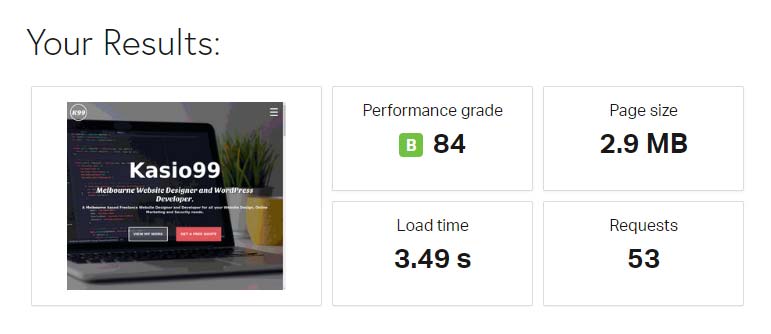Why is the speed of my website important?

I’ll tell you why the load time of your website is important, how to check the speed of your website and a couple of tips on how to improve your website’s performance.
There is nothing more annoying than when you are trying to find something online and the website that you visit just leaves you hanging. All you can see is a white browser window or a partly loaded website and the hypnotic spinning load wheel up in the browser tab. Think about what you are likely to do in this situation. I know what I do, press the back button and click on the next most relevant google result, likely to be that of the competitor.
As an owner of a website you need to think seriously about the load time of your website and the effect that it can have on your business and the experience it provides for your customers.
Most people will put huge amounts of effort into the look and feel of their website and give little thought about load time. Look and feel is important but in actual fact your website’s load time is the true first impression potential customers get when they visit your site. Try not to dissatisfied your users prior to even landing on your homepage.
Your website’s load time is also really important for Google ranking. Google gives your website a score based on how relevant your website is to what a user has searched for. A slow loading website will have their score penalised versus a closely related website with a better loading time. This is nothing new, Google wrote a blog post about this back in 2010 encouraging website owners to start thinking about the speed of their websites.
What causes slow website loading times?
There are a number of factors that can contribute to your website’s loading performance. Here are a couple of the common ones and you may notice a common theme:
Large images and other media files
The larger the file size of your images and other media on your website, the longer it will take for the browser to get them from your web server.
Too much functionality
If you get carried away with functionality on your website it’s easy to make it sluggish. It’s important to weigh up functionality and the benefits for your user versus the negative effect it may have on your website’s loading time.
Too many file requests
Websites are made up of lots of different pieces of code images and other stuff, each needing to be requested from the web server. Each one requiring a separate file request. The more file requests the longer your website will take to load.
Code complexity
The more complex and heavy the code behind your website the longer that it will take the web browser or the server to process the code and present consumable content back to the user.
The location and speed/quality of the website’s host server
A low quality shared hosting server on the other side of the world will take longer to deliver your website to the browser than a local dedicated server.
For a great reliable Australian host I recommend Digital Pacific
Too much traffic to your website
If you website is getting heaps of traffic that’s great though it could be slowing it down by putting too much demand on the server. Speak to your website host about how you can upgrade your hosting to deal with the amount of website traffic you are getting.
How to check the speed of your website.
Luckily there are some great free online tools that can test your website’s loading speed. Pingdom (https://tools.pingdom.com/) is a great website speed testing tool that will analyse the speed of your website and outline ways you can improve it.
At the time of writing this here is the test results that I got for this website: (Not bad huh?)

Some things that you can do right now to improve the speed of your website are:
Optimise images and other media for the web reducing file sizes and therefore reducing load time.
Only introduce functionality that is essential to the user experience. Anything more is going to have a negative effect on the load time of your website.
Make sure your website is only requesting files from the server that it needs.
Choose a reliable website host like Digital Pacific
If you would like have a professional freelance website developer look into improving the speed of your website then please contact me today.